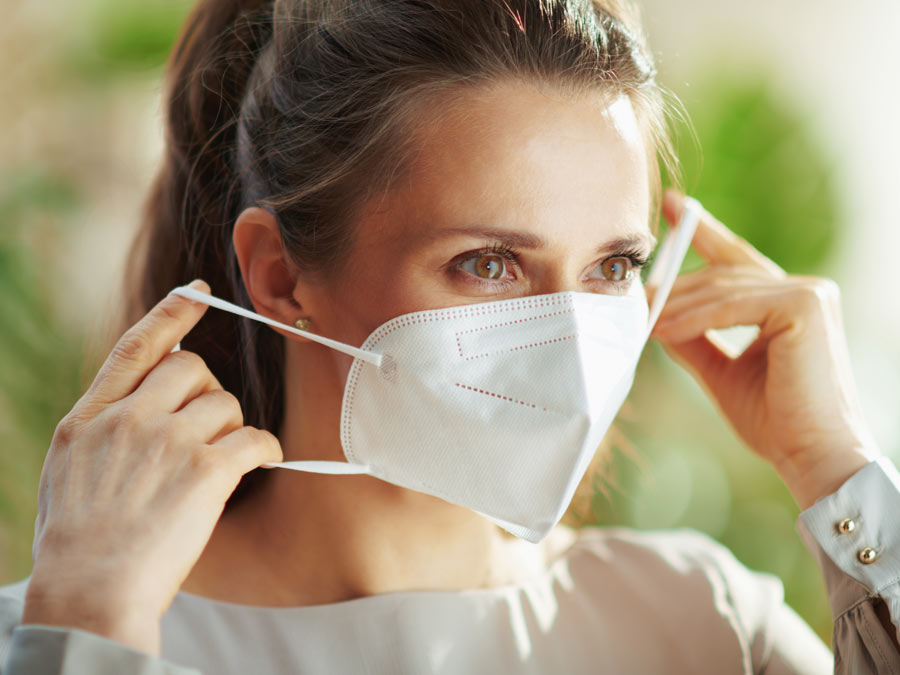Covid-19 Dental-Related Complications
The pandemic has had a monumental impact on a variety of aspects of life, and dental health is not an exception. Unfortunately, many people have reported symptoms associated with COVID-19 that have impacted their oral health. There are a variety of reasons why this can happen, but the most common reasons are due to the avoidance of seeking routine dental care during lockdown, as well as side-effects from prolonged mask wearing and pandemic-related stress.
What is Mask Mouth?
 When wearing a mask has a negative impact on oral health, this is called mask mouth. Mask mouth develops due to a variety of factors including dehydration, breathing recycled air and disrupted breathing patterns caused by wearing a mask. The symptoms and effects of mask mouth include:
When wearing a mask has a negative impact on oral health, this is called mask mouth. Mask mouth develops due to a variety of factors including dehydration, breathing recycled air and disrupted breathing patterns caused by wearing a mask. The symptoms and effects of mask mouth include:
- Bad breath
- Dry mouth
- Bleeding gums
- Tooth decay
- Periodontal disease
If you've been wearing a mask for long periods of time, there are ways to help avoid or combat the symptoms of mouth mask such as:
- Attention to your daily oral health routine
- Using mouth wash to kill bacteria between brushing and flossing
- Awareness of sensitive teeth or gums (can be a sign of infections)
- Always wear a clean mask
- Drink plenty of water
- See a dentist if you experience any symptoms
Maintaining Good Oral Health
When it comes to maintaining good oral health, it's important to have a sufficient daily dental routine in place that you do from home. Some good daily practices include:
- Thoroughly brushing your teeth at least twice per day for at least two minutes in duration
- Refraining from sharing toothbrushes with another person, as this can spread bacteria
- Switch your toothbrush out or a new one every three months
- Brush and floss your tongue, or use a tongue scraper, daily
- Do not use the same piece of floss in a different section of your mouth, as this can also cause bacteria to spread
- Stay hydrated by drinking plenty of water
- Avoid foods and beverages containing high amounts of starch or sugar
- Avoid chewing gum with sugar
- Develop healthy coping skills for stress and avoid negative coping skills such as smoking, drinking alcohol, or fingernail biting
- Continue with your routine if your gums bleed, as this will likely decline with consistent oral care practices
The Impacts of Pandemic-Related Stress on Oral Health
Sometimes when under extra stress in life, it's natural to clench one's jaw or grind teeth. Sometimes this happens during sleep and is difficult to control. Clenching and grinding teeth can lead to:
- Loose and/or cracked teeth
- TMJ pain (temporal mandibular joint)
- Extra wear on teeth
- Sensitivity in teeth to hot and cold substances
- Headaches
If you find that you're clenching or grinding your teeth, your dentist can make you a mouth guard. If you are experiencing pain from this habit, a warm compress can help, as can pain relievers. An over-the-counter mouth guard can be purchased for temporary use if you are unable to see a dentist right away to have a custom guard made. This can also help with your symptoms.
Unfinished or In-Process Dental Care
When the pandemic hit, many people had to abandon dental procedures in process that were not finished, or that were put on hold. If you had to leave cavities or gum disease untreated, it's best to continue with the good oral health routine guidelines mentioned above, as they can help combat some of the symptoms. Chewing a sugar-free gum can also help clean your teeth.
When to See a Dentist, Oral Surgeon or Orthodontist
It's important to come see a dentist, oral surgeon, or orthodontist, even during a pandemic, if you have anything serious that is in process such as oral surgery, braces, constant bleeding, pain and swelling, infections, dental trauma, or various special circumstances requiring dental care such as adjusting dentures while undergoing cancer treatment or having a biopsy on abnormal tissue in your mouth.
Patient Safety in Dental Offices
When seeing your dentist, it's important to abide by safe health practices to prevent the spread of COVID-19. This may require your dentist to take more time than usual as well to ensure you have a safe, clean environment, so come prepared with a patient mindset. Do inform staff if you are sick or have been exposed to someone who recently tested positive for COVID-19. If you have any symptoms of COVID-19, self-isolate and get tested before going to the dentist to ensure you are negative before you arrive.
As the world is starting to embrace a new normal while gradually returning to many of their routines and schedules pre-pandemic, it's still important to be health conscious of yourself and others when going out in public and seeking healthcare while also caring for yourself at home. This includes giving your oral health routine plenty of TLC.